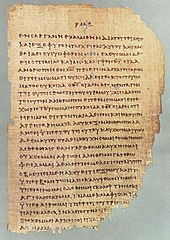This article is about the book in the New Testament. For other uses, see Book of Revelation (disambiguation).
| Books of the New Testament |
|---|
 |
| Gospels |
| Matthew · Mark · Luke · John |
| Acts |
| Acts of the Apostles |
| Epistles |
| Romans 1 Corinthians · 2 Corinthians Galatians · Ephesians Philippians · Colossians 1 Thessalonians · 2 Thessalonians 1 Timothy · 2 Timothy Titus · Philemon Hebrews · James 1 Peter · 2 Peter 1 John · 2 John · 3 John Jude |
| Apocalypse |
| Revelation |
| New Testament manuscripts |

Frontispiece, Book of Revelation, Bible of San Paolo fuori le Mura, 9th century.
The book spans three literary genres, the epistolary, the apocalyptic, and the prophetic.[5] It begins with John, on the island of Patmos (an island in the Aegean) addressing a letter to the "seven churches of Asia" (meaning Asia Minor). He then describes a series of prophetic visions, including figures such as the Whore of Babylon and the Beast, culminating in the Second Coming of Jesus Christ.
The obscure and extravagant imagery has led to a wide variety of interpretations: historicist interpretations see in Revelation a broad view of history; preterist interpretations treat Revelation as mostly referring to the events of the apostolic era (1st century), or, at the latest, the fall of the Roman Empire; futurists believe that Revelation describes future events; and idealist or symbolic interpretations consider that Revelation does not refer to actual people or events, but is an allegory of the spiritual path and the ongoing struggle between good and evil